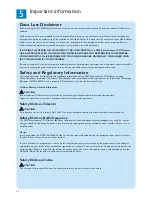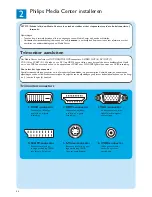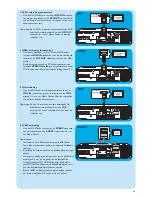
31
Other Wireless Devices
Safety Notices for Other Devices in the Wireless Network:
Please refer to the user documentation supplied with
wireless keyboard, wireless mouse, Bluetooth transmitter, or other devices in the wireless network for any additional safety
notices.
Local Restrictions on Radio Usage
The 2.4GHz frequency bands used by the MCP9360i Media Center are not fully harmonized in all countries.This equipment
has been certified for use in specific countries and should not be operated outside the countries or markets designated
below. As a user of this product, you are responsible for ensuring that this equipment is used only in the countries for
which it was intended and for verifying that it is properly configured with the correct selection of frequency and channels
for the country of use. Any deviation from the permissible settings for the country of use is an infringement of national law,
rules, or regulations and may be punishable as such. See below for country- specific information:
Europe Union frequency bands:
• Germany, Luxemburg, Netherlands, Spain, Sweden and the United Kingdom: 2.400 - 2.4835 GHz (Europe ETSI)
• France:
Metropolitan departments: 2.400 - 2.4835 GHz indoor use: 2.400 -2.454 GHz (channels 1 to 7) outdoor
use.
Guadeloupe, Martinique, St Pierre et Miquelon, Mayotte: 2.400 - 2.4835 GHz indoor and outdoor use.
Reunion, Guyane: 2.400 - 2.4835 GHz indoor use: 2.420 - 2. 4835 GHz outdoor use (channels 5 to 13)
• Italy:
For use in private premises; indoor or outdoor use: 2.400 - 2. 4835 GHz
For use in public premises; indoor or outdoor use; general use authorization is required from the Italian
Ministry of Post and Telecommunication: 2.400 - 2.4835 GHz.
• Belgium:
For use in private premises; indoor or outdoor use; less than 300 m operating range: 2.400 - 2.4835 GHz
For use in private premises; outdoor use and above public areas exceeding 300 m operating range, a
license from IBPT/ BIPT is required: 2. 400 - 2.4835 GHz.
Wireless interoperability
The MCP9360i Media Center is designed to be interoperable with any wireless LAN product that is based on direct
sequence spread spectrum (DSSS) radio technology and compliant with the following standards:
• IEEE 802.11a - Standard for Wireless LAN.
• IEEE 802.11b - 1999, Standard for Wireless LAN.
• IEEE 802.11 - Standard for Wireless LAN.
• Wireless Fidelity (WiFi) certification, as defined by WECA (Wireless Ethernet Compatibility Alliance).
Emissions Compliance Statements
Any changes or modifications to the equipment not expressly approved by Philips could void the user’s authority to
operate the equipment.
Installation and use of this device must be in strict accordance with the instructions included in the user documentation
provided with the product. Any changes or modifications (including the antennas) made to this device that are not expressly
approved by the manufacturer may void the user’s authority to operate the equipment.The manufacturer is not responsible
for any radio or television interference caused by unauthorized modification of this device, or the substitution of the con-
necting cables and equipment other than manufacturer specified. It is the responsibility of the user to correct any interfe-
rence caused by such unauthorized modification, substitution or attachment. Manufacturer and its authorized resellers or
distributors will assume no liability for any damage or violation of government regulations arising from failing to comply
with these guidelines.
















































